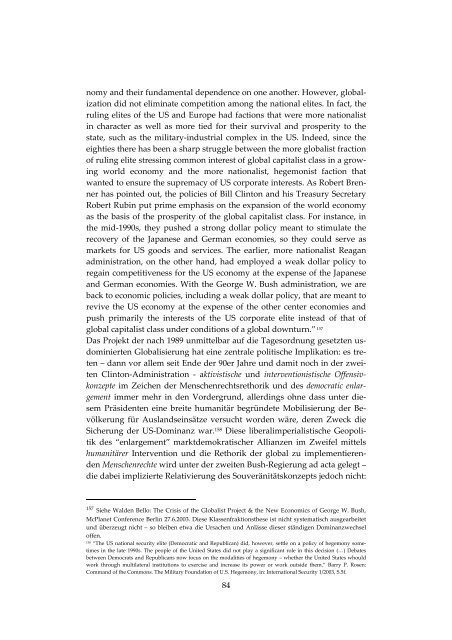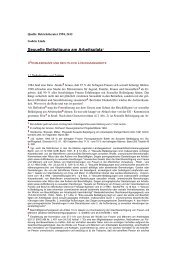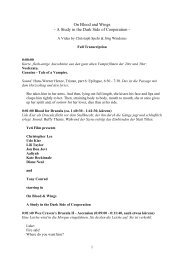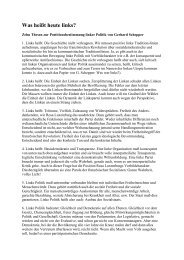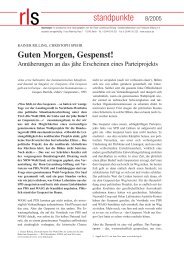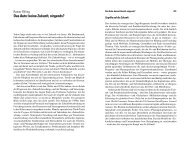outbreak. let's take over. american empire als wille ... - Rainer Rilling
outbreak. let's take over. american empire als wille ... - Rainer Rilling
outbreak. let's take over. american empire als wille ... - Rainer Rilling
Sie wollen auch ein ePaper? Erhöhen Sie die Reichweite Ihrer Titel.
YUMPU macht aus Druck-PDFs automatisch weboptimierte ePaper, die Google liebt.
nomy and their fundamental dependence on one another. However, globalization<br />
did not eliminate competition among the national elites. In fact, the<br />
ruling elites of the US and Europe had factions that were more nationalist<br />
in character as well as more tied for their survival and prosperity to the<br />
state, such as the military-industrial complex in the US. Indeed, since the<br />
eighties there has been a sharp struggle between the more globalist fraction<br />
of ruling elite stressing common interest of global capitalist class in a growing<br />
world economy and the more nationalist, hegemonist faction that<br />
wanted to ensure the supremacy of US corporate interests. As Robert Brenner<br />
has pointed out, the policies of Bill Clinton and his Treasury Secretary<br />
Robert Rubin put prime emphasis on the expansion of the world economy<br />
as the basis of the prosperity of the global capitalist class. For instance, in<br />
the mid-1990s, they pushed a strong dollar policy meant to stimulate the<br />
rec<strong>over</strong>y of the Japanese and German economies, so they could serve as<br />
markets for US goods and services. The earlier, more nationalist Reagan<br />
administration, on the other hand, had employed a weak dollar policy to<br />
regain competitiveness for the US economy at the expense of the Japanese<br />
and German economies. With the George W. Bush administration, we are<br />
back to economic policies, including a weak dollar policy, that are meant to<br />
revive the US economy at the expense of the other center economies and<br />
push primarily the interests of the US corporate elite instead of that of<br />
global capitalist class under conditions of a global downturn.” 157<br />
Das Projekt der nach 1989 unmittelbar auf die Tagesordnung gesetzten usdominierten<br />
Globalisierung hat eine zentrale politische Implikation: es treten<br />
– dann vor allem seit Ende der 90er Jahre und damit noch in der zweiten<br />
Clinton-Administration - aktivistische und interventionistische Offensivkonzepte<br />
im Zeichen der Menschenrechtsrethorik und des democratic enlargement<br />
immer mehr in den Vordergrund, allerdings ohne dass unter diesem<br />
Präsidenten eine breite humanitär begründete Mobilisierung der Bevölkerung<br />
für Auslandseinsätze versucht worden wäre, deren Zweck die<br />
Sicherung der US-Dominanz war. 158 Diese liberalimperialistische Geopolitik<br />
des “enlargement” marktdemokratischer Allianzen im Zweifel mittels<br />
humanitärer Intervention und die Rethorik der global zu implementierenden<br />
Menschenrechte wird unter der zweiten Bush-Regierung ad acta gelegt –<br />
die dabei implizierte Relativierung des Souveränitätskonzepts jedoch nicht:<br />
157 Siehe Walden Bello: The Crisis of the Globalist Project & the New Economics of George W. Bush,<br />
McPlanet Conference Berlin 27.6.2003. Diese Klassenfraktionsthese ist nicht systematisch ausgearbeitet<br />
und überzeugt nicht – so bleiben etwa die Ursachen und Anlässe dieser ständigen Dominanzwechsel<br />
offen.<br />
158<br />
“The US national security elite (Democratic and Republican) did, however, settle on a policy of hegemony sometimes<br />
in the late 1990s. The people of the United States did not play a significant role in this decision (…) Debates<br />
between Democrats and Republicans now focus on the modalities of hegemony – whether the United States whould<br />
work through multilateral institutions to exercise and increase its power or work outside them.” Barry P. Rosen:<br />
Command of the Commons. The Military Foundation of U.S. Hegemony, in: International Security 1/2003, S.5f.<br />
84


